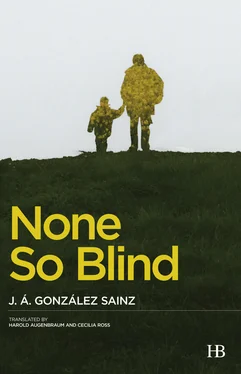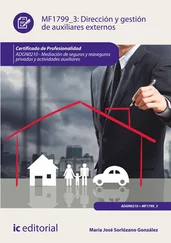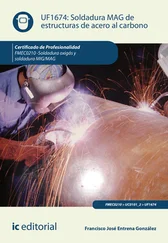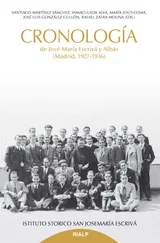But the worst stretch for him, the one that seemed the longest, was the giant, windowless wall of that interminable, graffitied hangar, which, although he didn’t know why, made him feel so helpless, or, paradoxically, so exposed, and then also later on when he would cross the gravel of the gas station’s expansive lot, making his way through the parked trucks. As he walked among those mastodons, with the soles of his feet unstable and unbalanced on the pebbles, he felt not only small and spiritless, as if he were a tiny, disposable thing, but also something akin to an inexplicable auger of anxiety in his stomach.
5
But the years, now marked by the rhythm of that commute, which had gradually become as familiar as his old road to the field, were passing comfortably. Asun, his wife, after a difficult adjustment period, seemed to be feeling more and more at home as time went on, and their son — their elder son, because a year after they moved there, they’d had another one, and with this one he had insisted, perhaps for reasons of nostalgia, on naming him Felipe — was well into his teenage years and had begun not only to go out with his posse of friends but to be out with them at what you might call every waking hour, in fact. To him, there was nothing as important as his posse, and no household routine or opinion, or, in any case, not his father’s, held the least value for him compared to those his friends would spout.
If once in a while it happened that he saw his son in their company — all of them as a rule in their coats or black leather jackets, their expressions looking unfriendly or as if they were owed something and would never be paid back, or never fully — the boy would of course act like he hadn’t seen him or hadn’t recognized him. He would turn his back on him or look off in a different direction, and in that other direction he would see that he was being increasingly barred from butting in with his paternal hoe to try to get rid of any weeds or secure any property markers.
Only when he was out with the pleasant-looking, young priest, the one with the pale complexion and a refined but friendly manner about him, or with the town councilman who was also the principal of a neighborhood school, whose friendliness, truth be told, was equally striking, did he deem it worth his trouble to say hello or even come over to him. It was clear he wanted to show off these friendships to his father, or show him who he was associating with, and he, in turn, would readily agree to exchange a few words with them, despite the fact that there was something about them, their carefulness itself, perhaps, their very amiability, from which he was nonetheless unable to separate a feeling of mistrust or detached condescension toward him that made him feel lesser or exposed, out of place, you might say, which made him even more confused than ever and prompted him to say to himself, perhaps with a bit of deep-seated exaggeration, that in spite of all, he almost preferred those casting the baleful eyes and wearing the black leather jackets. At least with them, he thought, no one was trying to put something over on you. So he would see his son, he would see his baleful eyes before he turned his back on him when he was with those casting their own baleful eyes, and then he would see his gleaming gaze, like a stork’s, when he would come over to him with the councilman or the little, pale-faced priest, but he couldn’t help but see him growing ever further apart, becoming even more of a stranger, flying far, far away in baffling and surely seductive circles he himself would never be able to enter.
It was true that Juanjo not only didn’t turn out to be much of a student but rather that at the first opportunity, or, to be more precise, right after they moved there, began to disparage academic instruction and all those who took their studies seriously — they’re just a bunch of losers, he would say — and an increasingly sour, antisocial attitude, which might, of course, be normal for a teenager but already showed signs of being anything but temporary here, had gradually and inexorably begun to dominate him. There would be days when he wouldn’t see him; he would come home — if he came home at all — very late at night, sometimes even when he was getting up and rushing to make his coffee before quickly grabbing his sandwich and leaving without wasting a minute, to wend his way to the factory. But no one could get through to him; if he ever tried to reprimand him for some reason or criticize him for something even slightly, not to mention if he ever told him off, he would waste no time in raising his voice with such anger and expressing such rage on his face, often with his mother’s support and understanding, that he would fall into a state of sheepish, impotent distress. So he slowly got used to putting up with his presence — just as one puts up with a hailstorm, he said to himself — and to hoping that by completely giving up any and all criticism of him, it might all clear itself up and he might eventually get his head screwed on right.
In the meantime, he had adapted well to factory life, to the various shifts, and even to the work itself, as well as to the trip to and from his neighborhood, which he seemed to make ever more acceptingly. In the morning, most of the time, he would wrap his sandwich in a sheet from one of the newspapers his son would bring home and then always leave around — on occasion flauntingly, he thought — and sometimes later on, during the lunch break, when he was eating it somewhere away from everyone else so he wouldn’t have to exchange a lot of idiotic, from his point of view, small talk with his coworkers — or put up with the complaints of those who, even though they may have good reason for it, never stop complaining about this or that or, more often than not the other thing — he would pass the time reading quietly, focusing, as his father had taught him from the time he was a small boy, on the words that said things and the ones that didn’t. Words are like birdsongs, he would explain; each person expresses themselves in their own way, just as each bird sings in its own way, and just as with birdsong, you know by their words who’s talking and what they’re up to.
Sometimes he would read news about crimes — attacks, the newspaper would say, violence, groups of people who murdered other groups of people, executed them, he had read, eliminated them, or kidnapped them, or put bombs under their cars or along the roadside — half-articles that began on a previous page or continued on a following one that he didn’t have there with him, or maybe fragments of articles or incomplete reports, which he read as fully as he could and hardly ever spoke about with anyone else.
But if he was only gradually getting used to the changes, his wife, Asun, Asunción García Bellido, especially now that their younger son was getting older, had been putting together a group of friends and finding ways to keep busy and seemed to have become perfectly acclimated or, as she put it, integrated. It was crystal clear that she was becoming more and more decisive, more sure of what she was doing and, especially, of what she was saying, even to the point, in his humble opinion, of becoming a bit arrogant. But even though it was true that the sweet, loving personality she’d had up to recently had been changing and that she had acquired manners that were not only brusque but disrespectful and volatile in a way he hadn’t seen in her previously, he thought it must have something to do with her getting older, with her struggle for life and to keep moving forward, with her satisfaction, even, at having succeeded in that, and that one didn’t always need to be the same in life and maybe what you were before wasn’t necessarily better. Just the opposite, in fact. Change enriches your life, it wakes you up, it motivates you; to see that, you just had to look at her — determined, full of energy and curiosity. What had happened was basically that the strong and decisive personality that hadn’t had any opportunity or avenue to develop in her youth had blossomed there. They were different times — even though not so many years had passed, if you really looked at it — and different circumstances.
Читать дальше












